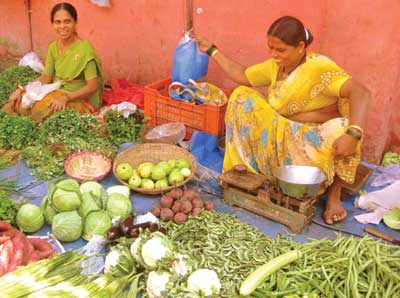- Home
- Archive -Jan 2013
- Getting vocal a. . .

Getting vocal about local
- In :
- Personal Growth
January 2013
By Akila Jaikumar
Akila Jaikumar reports on the recently held People’s Biodiversity Festival at Hyderabad
 |
The Peoples’ Biodiversity Festival was held at the Nampally Exhibition Grounds, Hyderabad, from Oct 13 to 16, 2012. The festival was organised by Jacob Nellithanam, a farmers’ rights activist, trustee and treasurer of Development and Justice Initiative from Chattisgarh, in conjunction with Chetna Organic Farmers’ Association, Secunderabad. It brought together farmers’ associations from across the country, to highlight their capabilities and offerings, share their concerns, and to bolster their commitment to their work with the knowledge that they were not alone. The festival was graced by the presence of Medha Patkar, and was addressed by PM Bhargava, founder director of the prestigious Center for Cellular and Molecular Biology (CCMB).
The festival was held in parallel with the COP-11 Biodiversity Convention at Hi Tech City, Hyderabad, between October 1 to 19, 2012. In contrast to the
pomp and pageantry associated with the latter, the People’s Biodiversity festival had government funding or support of any kind. No trees were cut to prepare the venue, no banners put up to herald the arrival of participants, helicopters did not fly them around, and no one took time off to play golf. Operating on a shoestring budget wholly based on contributions of members, the forum provided an alternative and pertinent source of informatio non to the Indian public on the food that they consume.
Traditional techniques
The participants at the festival were focused on displaying the rich biodiversity of Indian food grains, vegetables, and cash crops. Several participants emphasized the goodness of the traditional agri-techniques that depend on diversity and crop rotation in the fields, lower the risk, and assure a healthy crop free of pollutants and poisons. The scores of farmer suicides were attributed to the ill-advised switch to genetically modified (GM) and non-local crops, which made the farmer dependent on external agencies for supply of seeds, fertilizers and pesticides, for which he had no means to pay in the event of crop failure.
Localisation was another common theme. Growing crops suited to local conditions, use of techniques appropriate to the local environment and consumption of local produce to the extent possible were considered sustainable. They reduced the need of cross-country transportation with consequential reduction in consumption of fossil fuels. Eschewing of chemical fertilizers and pesticides in favor of farm-generated manure and compost was not only environmentally friendly, it also enabled the farmer to be self-sufficient.
Developments
There was no blind anti-development sentiment, however. Prominently on display was the adaption of the ‘System of Rice Intensification’ (SRI), a technique of rice cultivation with four main components – soil fertility management, planting method, weed control, and water (irrigation) management. Pioneered by Fr Henri de Laulanie, a Jesuit Priest System in Madagascar in the 1980s and popularised by Dr. Norman Uphoff from Cornell International Institute for Food and Agriculture, Ithaca, it has been adopted by many states in I
ndia, and the response from farmers has been overwhelming.
Also, numerous innovative machines were on display, which helped reduce manual labor and improved farming efficiency. A plethora of agri-literature was also on display in a number of dedicated bookstalls in the festival. The sane voices of Dr Bhargava, Medha Patkar, and others were also heard in the festival. Fishermen found a platform to express their concern over the harm done to marine and coastal resources due to pollution. Adivasis brought attention to large-scale deforestation as well as submergence of forest lands in the name of development.
An elegantly crafted wire model of a pair of bulls hitched to a hoe served as the mascot of the festival. The festival had a cultural component too with programs by various groups in the open-air auditorium, which also served as the venue of the talks. The offerings included Oggu Katha by women folk artistes, street plays by adivasi groups, jazz concerts, and musical programs by students and troupes. A cultural program was also put up on Oct 15.
Farmers do not need fertilizers, pesticides, or heavy-handed development. All they need is an assured supply of water – to enable them to feed the Indian population. The need to protect and sustain India’s rich biodiversity and its eco-system, especially against often ill-conceived and inappropriate interventions of governmental agencies was a common thread of thought in the festival.
To read more such articles on personal growth, inspirations and positivity, subscribe to our digital magazine at subscribe here
Life Positive follows a stringent review publishing mechanism. Every review received undergoes -
- 1. A mobile number and email ID verification check
- 2. Analysis by our seeker happiness team to double check for authenticity
- 3. Cross-checking, if required, by speaking to the seeker posting the review
Only after we're satisfied about the authenticity of a review is it allowed to go live on our website
Our award winning customer care team is available from 9 a.m to 9 p.m everyday
The Life Positive seal of trust implies:-
-
Standards guarantee:
All our healers and therapists undergo training and/or certification from authorized bodies before becoming professionals. They have a minimum professional experience of one year
-
Genuineness guarantee:
All our healers and therapists are genuinely passionate about doing service. They do their very best to help seekers (patients) live better lives.
-
Payment security:
All payments made to our healers are secure up to the point wherein if any session is paid for, it will be honoured dutifully and delivered promptly
-
Anonymity guarantee:
Every seekers (patients) details will always remain 100% confidential and will never be disclosed
